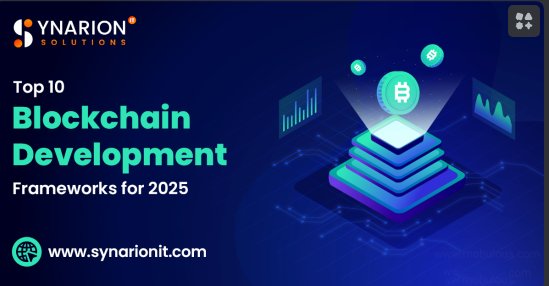Top 10 Blockchain Development Frameworks for 2025

Blockchain technology has rapidly evolved from a niche concept into a cornerstone of modern digital transformation, offering unparalleled security, transparency, and decentralization. With its application extending beyond cryptocurrencies to industries like supply chain, healthcare, finance, and more, blockchain app development has become a crucial focus for businesses looking to innovate and enhance their operations. For companies looking to leverage the power of blockchain, choosing the right development framework is key to success. In this blog, we will explore the top 10 blockchain development frameworks for 2025 that are shaping the future of blockchain solutions. Whether you're working with a blockchain app development company yourself, these frameworks will set the stage for building scalable, secure, and efficient blockchain applications.
1. Ethereum
Ethereum has long been the leader in blockchain app development, and it continues to dominate the space as we approach 2025. Known for its smart contract functionality, Ethereum is the foundation for many decentralized applications (dApps) and decentralized finance (DeFi) projects. With the transition to Ethereum 2.0, the network promises improved scalability, security, and energy efficiency, making it even more attractive for blockchain app development companies looking to build robust applications.
2. Hyperledger Fabric
Hyperledger Fabric is a permissioned blockchain framework designed for enterprise use cases. Developed by the Linux Foundation, Hyperledger Fabric is highly modular and enables businesses to build scalable and secure blockchain networks with a strong focus on privacy and confidentiality.
3. Polkadot
Polkadot is a next-generation blockchain platform designed to connect different blockchains, allowing them to interoperate seamlessly. By creating a decentralized web of blockchains, Polkadot’s framework enables data and value transfer between otherwise isolated blockchain networks.
4. Solana
Solana is known for its high throughput and low transaction fees, making it an attractive blockchain framework for decentralized applications (dApps) and decentralized finance (DeFi) projects. With its consensus algorithm, Proof of History (PoH), Solana is capable of processing thousands of transactions per second (TPS), providing a faster and more cost-effective alternative to Ethereum.
5. Cardano
Cardano is a blockchain platform focused on scalability, sustainability, and security, making it a strong contender for blockchain app development in 2025. With its proof-of-stake (PoS) consensus mechanism, Cardano offers a more energy-efficient alternative to traditional blockchain networks.
6. Tron
Tron is a popular blockchain framework that focuses on decentralizing the web and providing fast and low-cost transactions. Its protocol is optimized for building dApps and creating decentralized content platforms, making it a great choice for developers aiming to revolutionize industries like media, entertainment, and gaming.
7. Tezos
Tezos is a self-amending blockchain platform designed to evolve and improve over time without requiring forks. Its unique governance model, which allows stakeholders to vote on protocol upgrades, makes it a promising framework for businesses seeking long-term blockchain solutions.
8. Avalanche
Avalanche is a blockchain platform that offers high scalability, low latency, and robust security for decentralized applications and custom blockchain networks. It’s known for its consensus protocol, which can process thousands of transactions per second, making it a strong choice for DeFi and dApp development.
9. Chainlink
Chainlink is a decentralized oracle network that allows smart contracts to interact with real-world data in a secure and reliable way. While not a traditional blockchain framework, Chainlink plays a crucial role in enhancing the capabilities of blockchain platforms by providing them with off-chain data.
10. Cosmos
Cosmos is a blockchain framework designed to address scalability and interoperability challenges. Its modular architecture allows developers to build custom blockchains that can communicate with other blockchains, creating a more connected and scalable decentralized ecosystem.
By using Cosmos, blockchain app development services can focus on creating custom blockchains tailored to specific business needs while taking advantage of Cosmos’ Inter-Blockchain Communication (IBC) protocol to connect their applications to other networks. The scalability and interoperability offered by Cosmos make it an ideal choice for projects that require cross-chain communication and high transaction throughput.
Conclusion
As we move into 2025, blockchain technology is expected to continue its rapid growth, with new frameworks and innovations shaping the future of decentralized applications. Whether you're building a blockchain solution for supply chain management, decentralized finance, or enterprise applications, choosing the right development framework is critical to success.
From Ethereum’s smart contract capabilities to the scalability of Polkadot and the interoperability of Cosmos, the top 10 blockchain development frameworks highlighted in this blog are the key players in the blockchain space. If you're working with a blockchain app development company, these frameworks provide a wealth of options to create scalable, secure, and innovative blockchain applications that will define the next wave of digital transformation.
What's Your Reaction?

















